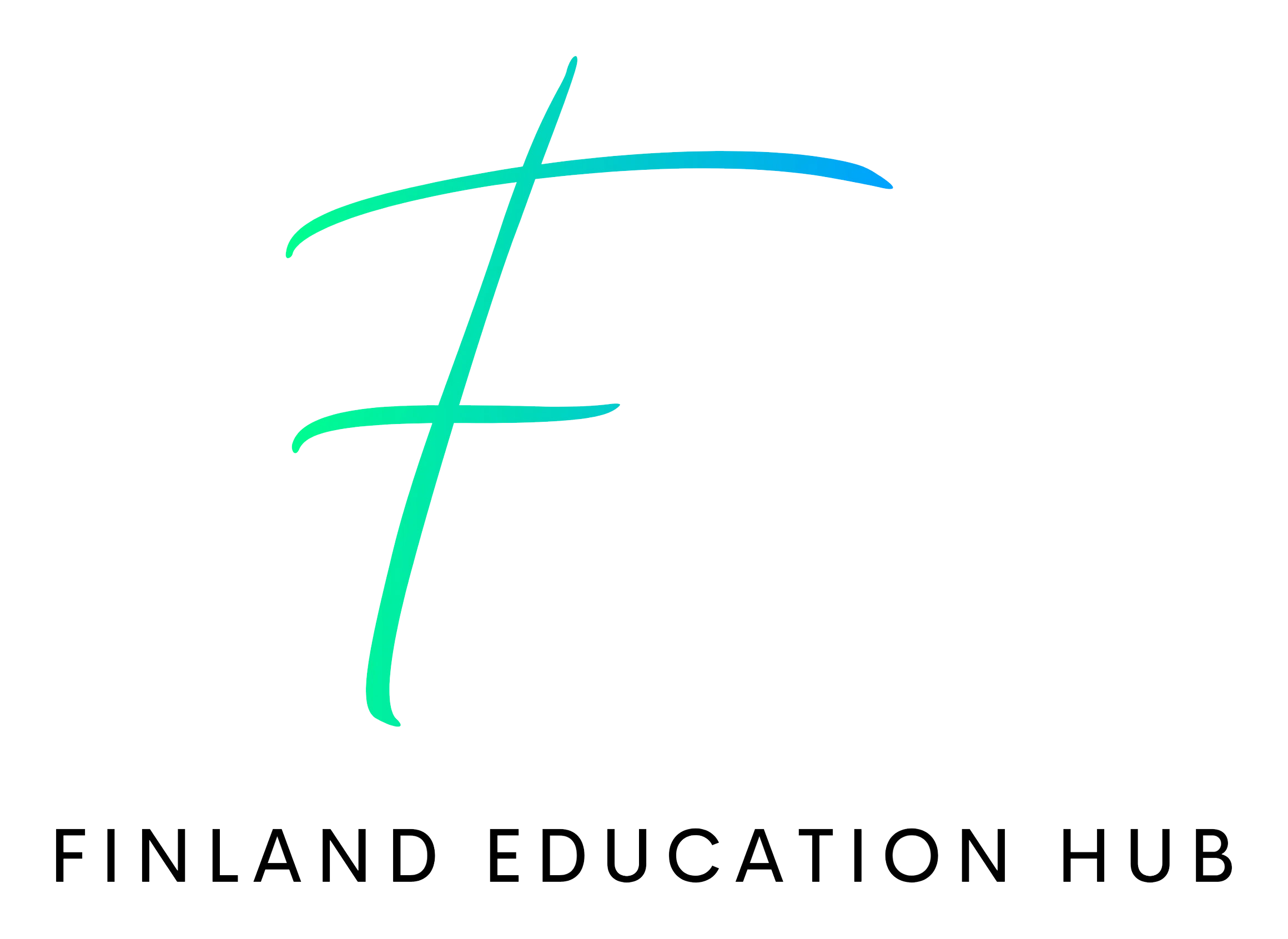WHY FINNISH SCHOOLING?
The Latin roots of the word Education means “to lead out” and not to mould a child into a box as is unfortunately the practice in classrooms all over the world with only one country being a robust exception to that- Finland! Good education is focused on relevant skill building. It leads a student to find and sharpen their strengths to achieve their optimal potential. This ideal outcome of education is something that is difficult to fit into neat rubrics for conventional assessments which is why the need of the hour is qualitative measurement of learning rather than a quantitative approach. In a world where we fixate on amassing qualifications while we ignore their applicability – we have created environments where critical thinking, originality and work readiness are barely encouraged. According to one of the most Influential studies in higher education history- The Gallup-Purdue Index the most important ingredients of education that lead to success later in life were analyzed and it was deduced that Relationship rich (teachers and mentors that care) and work integrated experiences impact ones success the most and less than 1/3rd of the worlds students have these experiences at school or college.
Finland’s education however, is a stark contrast from the rest of the world – they possessed the will to course correct, to have the policies and tools in place to nurture individuals, to lead out students to attain skills in learning and living. Education today ironically stamps out the spirit of learning and growing but Finland has set the Gold standard with its unique approach.Finland is famous for schooling that starts kids at age seven, gives them short days ,no homework, no textbooks, few exams, lots of crafts and music and outdoor expeditions and yet turns out pupils that shoot the lights out in the International Student Assessment (PISA) rankings – which has got the whole world looking under the hood of Finnish schooling. Today we witness most countries inject Finnish approaches into their curriculums to customize their pedagogy for their countries.The key factor has been the skill and autonomy provided to teachers to navigate each class in a highly personalized manner. This has revolutionized the global education market and opened up avenues to make teachers and students across the world feel like they belong to a global village.

MAKING INROADS INTO INDIA
There is overwhelming evidence that various forms of experiential learning are what form the core skill set of a well-rounded and successful individual. Yet, in India we have placed performance on grades and test scores above everything else and skills relevant to the world we live in remain fringe aspects of our curriculum. The outdated lecture model, rote memorization, quizzes/tests and exam papers remain the dominant educational pedagogy. Ironically, the ancient Gurukul system of India was celebrated all over the world for its excellence and some of the earliest educational institutions originated from the sub-continent too but over time they devolved into a rigid and limiting format born out of dire need and a byproduct of the changing times. This was an unfortunate regression that happened over centuries. India went from being the centre of learning in the ancient world to a regressed education system that was chosen for it by multifarious factors through history. India as a country today values Credentials over Education. A system that induces meritocratic hubris where there is little to none engagement with education. The latest survey conducted in 2021 by Programme for International Students Assessment (PISA) revealed that there is a focus on rote learning in most schools and the dearth of skilled teachers that encourage creative learning is why Indian students fare poorly at the international work level. There is an urgent need to prepare the learners for a challenging future rather than to equip them with archaic information.
As the younger generation of Indians become parents their experiences in the real world have gleaned insight into the redundancy of India’s education practices in the post-modern world. The advent of technology and globalization has galvanized change in the mindsets of the informed 21st century parent and teacher. While there is a rising trend in parents and educationists looking to empower students in life skills rather than archaic ideas of knowledge it is impossible to ignore that the latter forms the very fabric of education systems in India. To update centuries of education practices is a challenging task that will impact the entire ecosystem of learning that exists and hence a most deeply informed approach is needed. This is where cultural specificity and regional customization of Finnish education steps into the picture. To emulate the Joy and ease of a Finnish classroom without cloning it, To preserve the rich cultural diversity of India while adapting activity based learning and other core experiential learning concepts into the curriculum and to up skill teachers to take the baton of nurturing individuals with personalized attention. The success of adapting Finnish based concepts into the Indian curriculum has been trailblazing. The approach makes for creatively robust and highly competent teachers that report high job satisfaction. The children are a happier, confident, creative bunch that can think outside conventional boxes and can communicate effectively.
Finland’s education however, is a stark contrast from the rest of the world – they possessed the will to course correct, to have the policies and tools in place to nurture individuals, to lead out students to attain skills in learning and living. Education today ironically stamps out the spirit of learning and growing but Finland has set the Gold standard with its unique approach.Finland is famous for schooling that starts kids at age seven, gives them short days ,no homework, no textbooks, few exams, lots of crafts and music and outdoor expeditions and yet turns out pupils that shoot the lights out in the International Student Assessment (PISA) rankings – which has got the whole world looking under the hood of Finnish schooling. Today we witness most countries inject Finnish approaches into their curriculums to customize their pedagogy for their countries.The key factor has been the skill and autonomy provided to teachers to navigate each class in a highly personalized manner. This has revolutionized the global education market and opened up avenues to make teachers and students across the world feel like they belong to a global village.

OUR JOURNEY
The genesis of Finland Education Hub is a story of adaptability, innovation and resilience which is the ethos we preach. As India embedded Finnish educational practices there were many logistical, infrastructural and psychological barriers that stood in the way of Finnish companies trying to navigate a highly rigid system that was averse to change. Our founders were part of the team of experts helping the reputed New Nordic School get the ball rolling to set up an avenue for Indian education to opt for the research-based learning. The intent of updating Indian education to level up to international standards was a gold mine of transformative change but the approach was too novel for a conservative market back in 2020.
The New Nordic School had to restructure its business model in south Asia due to the road-blocks relating to localization and scalability but this fueled a keen desire within the heart of the founders of FEH to create meaningful improvement in India’s school education system by embedding and adapting Finnish education practices to the local education ecosystem. This fanned the fire that drives team FEH to design services that fit into the ground reality of Indian schools and add value to the quality of education disseminated at each tier of the socio-economic strata.
Co-Founded by Ashish Srivastava (CEO), Tarun Bhatt (COO) and Deepika R Phukan (CMO) we are lead by a passionate trio who want to gradually and effectively change the educational services of the country from ground-up. As parents and ex students of the same educational background themselves, the founders have found summative assessments and government mandated curriculum a recipe for dull childhood that drains out curiosity and individuality. A common goal to renovate the sterile principles of traditional education in the country has brought the three founders and a devoted team of professionals from the education industry to join hands in painting a new future for Indian teachers and students.
Backend by intensive knowledge and first-hand experience in Finnish schools we offer seamless collaboration of the pre-existing Indian curriculum with the Finnish model of learning to arm individuals with skills to take on the challenges of the modern world. An emphasis on leadership, mindfulness and shared responsibility of teaching all children in a personalized manner so that their different abilities are respected and honed is at the heart of all our endeavors. This can come about only by collaborating with the teachers closely and FEH has an array of comprehensive teacher training programs that intrinsically motivate, up skill and empower a teacher to architect a lively classroom with skills and systems in place that meet the unique needs of every student. The team works closely with empirically backed strategies, teaching tools and myriad resources to help every teacher enrolled in our programs to elicit an emotional engagement in learning from her students rather than simply amassing knowledge. Sharing fruitful partnerships with many reputed schools at both the first and second tiers of the socio-economic realms has made for an incredibly gratifying first year of FEH. It is the sincere desire of the leaders and teachers of these schools to transcend diminutive walls of orthodox systems that has encouraged us to dive head on into the challenge of customizing our services to best support their unique needs. Feedback from parents and as we built new learning cultures has turned our education insights into a reality
